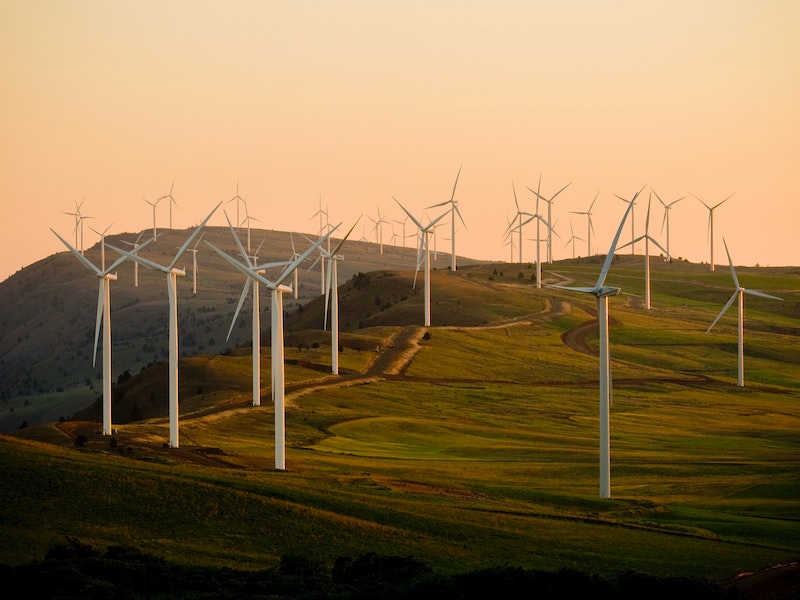Ideas have the power to destroy, the power to enlighten, the power to change the entire world. At present, the ideas and beliefs that shape society are destroying the natural world we depend on for our existence. These ideas risk a future where social collapse is a real possibility. And yet, it is the fact that ideas and beliefs that come to form society change over time that provides hope in a time of despair. The ideology of sustainability is a symbol of that hope.
Our current economic and social structure isn’t sustainable. Sustainability was born as a reaction to that fact. It seeks to create an economy and society that work in harmony with the natural world.
To do so, the current system must transform beyond recognition. That presents lots of challenges. None more so than the rich elite who don’t want wholesale change because they gain their power and influence from things as they are.
Change may be desperately needed, but those who have the most influence in catalysing change are the ones most resistant to change.
The challenge then is monumental. But, every problem (no matter how large) also presents an opportunity.
The situation we find ourselves in may be unique in its scale, but it has many similarities to another ideology that changed the world.
The Enlightenment triggered profound changes in France during the eighteenth century that gave rise to the political system that now dominates around the world. The ideas and beliefs of the Enlightenment could only start to influence society due to the French Revolution — one of the most momentous moments in human history.
Here are seven reasons why history could be repeating itself, and we may be on the cusp of the great revolutionary moment of the modern world.
1. Sustainability questions the status quo
Many of the ideas and beliefs that form modern society are the result of the Enlightenment. Democracy, freedom of speech, freedom of representation, the foundations of our political system formed due to this great ideological movement.
But, for the ideas of the Enlightenment to begin forming the basis of society, it began in the same way as the ideas forming the ideology of sustainability.
In both cases, each movement developed through a desire to question the status quo.
The philosophers who inspired the Enlightenment argued that a society grounded in religious superstition was holding back social progress.
Today, the ideas and beliefs that make up our economic system are being questioned. None more so than economic growth, the foundation of the economy. More and more people are waking up to the fact that the benefits of economic growth — increasing incomes resulting in social development — are being outweighed by the costs — environmental destruction.
Just as the Enlightenment was seen as a new dawn, a new way of doing things that could unlock social progress, sustainability offers solutions to the current problem.
2. Sustainability contradicts the current beliefs
An issue in both cases is that the beliefs and ideas forming the new ideology undermine the beliefs of the old ideology.
When The Enlightenment started to gain influence during the eighteenth century, the church was the dominant institution in French society. The ideas and beliefs of the church were a core part of the social structure. The Enlightenment questioned the authority of the church. And there was a general feeling that the church, rooted in superstition, was holding back social progress.
In the case of sustainability, economic growth is the engine of the economy. The fuel that feeds the engine is consumption. The two are interconnected. An issue with these beliefs is that for the economy to continue expanding, we need to continue taking stuff from the natural world.
An inevitable outcome of increasing economic growth is increasing emissions of greenhouse gases. This is at a time when the UN argues emissions need to reduce by 7% a year for the next decade to keep increases to the climate below 1.5°C.
Continued economic growth undermines efforts to deal with environmental destruction because economic growth is one of the key reasons why society has become so destructive to the planet we need to survive.
On top of this, economic growth on a finite planet is, by definition, impossible. It sounds obvious, but if something isn’t sustainable, there will be a time when it can no longer be sustained. Many advocates of sustainability are calling for the goals of the economy to change. Growth at all costs needs to be replaced by a goal that can be sustained indefinitely.
3. Sustainability is in a marriage of ideological convenience
The core ideas of the Enlightenment and sustainability contradict and undermine the respective dominant ideology of their day. But in both cases, the Enlightenment and sustainability have been embraced.
In France, enlightenment thinking became the fashion of the day. The old order embraced enlightenment thinking, adapting laws, ideas and economic thinking around enlightenment principles. But it could only do so up to a point. To fully embrace this new way of doing things would be to question the church and the foundations that society was built upon.
The king, whose authority and influence was intertwined with the church remaining the dominant force in society, was unlikely to embrace Enlightenment thinking entirely when doing so would undermine his position of authority.
The old order then was limited in how and what aspects of Enlightenment thinking it could embrace. The fact enlightenment thinking contradicted the old order meant it was a marriage of ideological convenience.
It is a similar story today. Many companies and governments have embraced sustainability and made it a core part of their strategy. But the bottom line is that companies are still driven by the profit motive. Meanwhile, governments still pursue policies that will encourage economic growth.
Companies claim to embrace the triple bottom line of people, planet, profit. But so long as the economy centres on the profit motive, these claims are largely an aspect of greenwashing.
Profit remains the key consideration of all businesses. If it’s not, the business could go bust. Inevitably some business decisions will result in harm to the environment because it is the key consideration that trumps anything else.
Governments claim to be steering each country towards a low carbon economy. But, they seem resistant to implementing policies like a carbon tax that would reveal the true cost of carbon-intensive industries like oil.
In both cases, while the new ideology has been embraced, it’s being done so in a clunky sort of way as the beliefs of the new ideology contradict those of the old.
4. Sustainability is not a revolutionary movement
Enlightened thinkers did not want to replace the old way of doing things. While they questioned many elements of the social system, particularly the church’s influence, they were focused on adaptation, not transformation.
It’s remarkably similar today. Groups like Extinction Rebellion who call for systems change are considered extremists.
Meanwhile, many sustainability consultants are hired by companies to help them create sustainability strategies. They are moderates who not only argue capitalism needs to adapt, not transform but benefit from supporting the continuation of a system that is undermining itself.
The issue with adaptation, not transformation is that the thing sustaining society in its current form is a set of belief systems. Within the old order in France, those beliefs were centred around the church. In modern society, those beliefs centre on free-market capitalism and how it organises the world economy.
The system creating the problem does so by design. Without questioning the design of the whole system, inevitably, you end up with the same problems recurring.
The only way that a system has historically changed is when the ideas and beliefs that form the foundations of society start to undermine themselves.
5. Sustainability is on the cusp of change
And it is here where sustainability finds itself in a very similar position to the Enlightenment on the dawn of the French Revolution.
The only way enlightenment thinking could dominate in France was if the old order and the ideas providing it legitimacy collapsed.
And in the French Revolution, that’s what ended up happening.
The Enlightenment thinker did not trigger the revolution. What did was a set of interconnected factors that had one thing in common. They were all a result of the weaknesses inherent in the old way of doing things.
France was bankrupt, and there were widespread protests and massive discontentment. These factors led to the rules governing society breaking down.
And it was state breakdown that led to the old way of doing things being questioned. State breakdown created an ideological vacuum because it was clear the beliefs of the old order no longer worked.
That vacuum provided the Enlightenment with an opportunity to redesign society in its own image.
6. Sustainability is a revolution in the making
The similarities to today are obvious. The beliefs sustaining society are undermining the natural world and leading us to a highly uncertain and unstable future. Once the world around us changes, it’s going to be far harder to sustain the basic needs of society.
People tend to be fairly content when they have their basic needs met. It’s only when food, water and shelter are at risk that social instability arises. It’s remarkable how passive people can be when they have something to lose. If they have nothing to lose, then they have everything to gain from things changing.
This is what happened during the French Revolution and could happen once again when the climate crisis really starts to have noticeable impacts on the world around us.
It’s then that social breakdown could occur. And because the climate crisis is a global problem, its impacts will affect everyone and everything.
In that situation, it will become increasingly obvious that free-market capitalism is no longer fit for purpose. A vacuum could be created that will create an opportunity for the ideas and beliefs of sustainability to fully express themselves and form the building blocks of a new society that places social and environmental well-being at the heart of social success.
What’s needed is to wipe the slate clean and start again. The only way that can happen is through social revolution.
7. Sustainability will be resisted by a tiny minority
Everyone’s lives revolve around a way of doing things. That way of doing things brings order, stability and an element of certainty to life. That’s why revolutions are so rare because everyone has something to lose if everything changes.
Because the beliefs of the current system result in environmental destruction, the longer things remain as they are, the more likely we will hurtle towards social breakdown.
We’re in a trap then because for the elite to remain powerful, things must be maintained, but that is the very scenario that means we are hurtling towards a situation where these conditions can’t be maintained.
The major difference between today and France pre-1789 is that the dominant ideology of the day was being questioned in France. Today the ideology that dominates is a world ideology.
For sustainability to begin dominating on a global scale, every country must embrace the ideology of sustainability. And so, nothing less than global change will do.
If history does repeat itself and social breakdown occurs, let us hope that cooperation wins out and humanity can stand together to build a society and economy that allows for the environment to flourish.
Who knows, in the future, people may look back at this time as if it is as alien as us looking back at a time before the Enlightenment. If that happens, humanity will have won against a tiny minority that seems content to continue destroying the world for their own gain.



